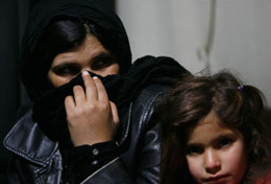Parents marry off daughters in attempt to protect them, says new study
New research, released today by World Vision, shines a new light on the link between conflict, disasters and early child marriage.
 “Early marriage is a brutal curtailment of childhood and a violation of children’s rights, yet many parents around the world believe it is the best possible way to ensure their daughters are looked after,” says Erica Hall, World Vision spokesperson.
“Early marriage is a brutal curtailment of childhood and a violation of children’s rights, yet many parents around the world believe it is the best possible way to ensure their daughters are looked after,” says Erica Hall, World Vision spokesperson.
“We’ve found that early marriage is often perceived by families as a protective measure and is used by communities as a way to respond to crisis.”
Of the 25 countries with the highest rates of early marriage, the majority are affected by conflict, fragility or natural disasters, the report finds. And girls trapped in early marriage tend to be poor, under-educated and living in rural areas where birth and death rates are high and where conflict is common.
“Girls who live in countries facing humanitarian crises, such as the food shortage in West Africa, are left especially vulnerable as the families, teachers, friends, leaders and networks they could usually rely on are disrupted, leaving them more exposed to abuse. In extreme cases, during conflict such as Syria and the Democratic Republic of Congo for example, support for the protection of children may be non-existent.”
The inability to provide food for family members is a major reason why parents decide to marry their daughters off at a young age.
As a member of the IF coalition, World Vision is campaigning for changes in the broken food system, which is responsible for one in eight people going to bed hungry each night.
“Our research found that parents and girls resort to early marriage as a protection against both real and perceived risks, because they believe they have no alternatives,” said Hall. “However, girls who marry young are more at risk of violence, malnutrition and devastating complications in childbirth. In seeking to protect their children, parents can end up exposing them to situations they were aiming to protect them from.”
The report highlights the need to ensure humanitarian responses address the risks of child marriage and other forms of violence against women and girls. The impact of early marriage can be catastrophic, ranging from severe sexual and reproductive health complications and an increase in child mortality, to domestic violence, social isolation and extreme poverty. And yet, in the face of this and the widespread condemnation of the practice, early marriage continues to flourish.
“Every year another 13.5 million children are married under the age of 18, and current trends show this will increase to more than 14 million each year. But we know from our work with families and communities around the world that change is possible. We’re asking people to join with us in committing to ending early marriage by 2030. We need to see that the cycle of poverty, fear and inequality created by early marriage is broken for future generations of girls. We owe it to them.”